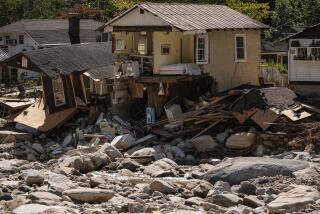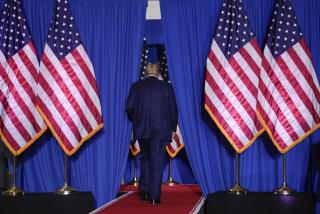Candidates Call Facts as They See Them
- Share via
WASHINGTON — As President Bush and Sen. John F. Kerry wrestled over foreign policy in their first debate Thursday, some facts were oversimplified, others were exaggerated and still others dropped from sight entirely.
No mistake was so glaring that it was likely to do lasting damage to a candidate. But as they grappled on the familiar territory of the Iraq war and related subjects, the combatants shaded the truth again and again in ways that echoed what they have said on the campaign trail.
Bush, for example, eager to blunt Kerry’s charges that he charged unilaterally into the Iraq war, contended that his administration had “used diplomacy every chance we get.” In fact, though Bush sought United Nations approval for the war in early 2003, it had become clear that the administration’s patience for diplomacy was nearly exhausted. The administration rebuffed proposals from other countries that would have extended international weapons inspections and delayed the March 2003 invasion.
Kerry, on the other hand, seeking to portray the war as reckless, asserted flatly that Bush had “no plan” for the aftermath. In fact, the administration had elaborate sets of plans for handling the various crises that officials anticipated, such as oil-well fires and huge refugee flows. The problem they later confronted was that the assumptions behind the plans proved wildly wrong.
Bush tinted some of the war’s developments with optimism. In seeking to show international support for the U.S. effort, the president cited an upcoming meeting this month in Tokyo to discuss $14 billion in aid pledged to the rebuilding effort. He failed to mention that many donors had yet to fulfill their pledges 12 months after they made a commitment to do so.
Bush also sought to portray efforts underway as projects completed. Outlining his administration’s progress against nuclear proliferation, he asserted that the network of Pakistani physicist Abdul Qadeer Khan had been “busted” and “brought to justice.”
However, Khan himself was pardoned by Pakistani President Pervez Musharraf in February, and of 11 staff members at the top-secret Khan Research Laboratories near Islamabad originally believed to be involved in the nuclear trafficking, none has been charged after lengthy detentions and interrogations. International investigations are still underway.
Similarly, to show that he has made progress in the war on terrorism, Bush said, “75% of known Al Qaeda leaders have been brought to justice.”
The CIA has attempted to quantify the success of U.S. efforts against the terrorist group and has tallied the number of its “known leaders” at the time of the Sept. 11 attacks who have been killed or captured. The agency used a rough estimate of two-thirds earlier this year, and increased its estimate to three-quarters this summer. But many terrorism experts say the estimate is misleading because Al Qaeda is a decentralized network of groups and new leaders often spring up after others die.
On several points, Bush and Kerry misrepresented each other’s position. During discussion of his planned missile defense system, Bush said that “my opponent is opposed to the missile defenses.”
Kerry is not opposed to the missile defense program, although, on the campaign trail, he has advocated reduced spending for the program.
Kerry may have been exaggerating when he said the president hadn’t put “one nickel” into protecting subways from the threat of a terrorist attack. But he was on the right track when he suggested that spending on mass-transit security lagged far behind the investment in protecting airports.
Although the aviation security budget is about $5 billion a year, the government has spent just $115 million on transit security since the Sept. 11 attacks. Bipartisan legislation in the Senate calls for a $5.2-billion investment.
Separately, Amtrak has received more than $70 million to fund security and safety improvements in the tunnels serving New York’s Penn Station, used by more than 300,000 commuters each day.
Kerry said the cost of the war was $200 billion, money “that could have been used for healthcare, for schools, for construction, for prescription drugs, and it’s in Iraq.”
He exaggerated somewhat how much money has been spent in Iraq so far. Congress has appropriated funding for operations there and in Afghanistan in three installments that total about $180 billion. Not all of that has been spent. However, no one doubts that the bill will eventually exceed $200 billion.
Kerry’s suggestion that funding for the war was taken from domestic priorities was a bit of a stretch. Even while funding the war, Congress recently approved a major expansion of Medicare to include prescription drug benefits and has continued to increase spending for education and highway construction.
Bush said there were currently a “hundred thousand troops trained” -- close to the 96,681 trained police and military forces cited in a Sept. 22 statement by the Defense Department.
Though Bush’s claim is factually true, it has drawn strong criticism as an overstatement by Democrats in Congress and independent military experts. Deputy Secretary of State Richard L. Armitage acknowledged last Friday to Congress that some of the forces were “shake-and-bake” trainees, with three weeks of training or less.
Many police lack equipment or vehicles. Army Lt. Gen. David H. Petraeus, the U.S. official in charge of training, has been unable to fill his staff needs.
At one point in the debate, Kerry implied that a U.S.-backed plan to build military bases in Iraq was a prelude to a permanent U.S. presence there. He said that “some people say [the bases have] got a rather permanent concept to them.”
U.S. reconstruction officials, however, have long insisted that 14 bases are being built or refurbished from existing bases to provide housing and training facilities for the Iraqi army and security forces. The U.S., they say, will maintain a presence in Iraq only as long as the Iraqi government permits it.
In saying that nine of 10 active-duty Army divisions have played a role in Iraq or are planning to, Kerry actually understated the case. Nine divisions have either fought in Iraq or are planning to, and a brigade from the 10th -- the South Korea-based 2nd Division -- is now in Iraq.
Kerry contended that the United States and only two other countries, Britain and Australia, sent troops to Iraq in the initial thrust. In fact, Polish special forces were part of the first wave.
But Kerry was correct in saying that the largest share of coalition forces by far are American, and that U.S. contributions dwarf all others. Of the 30 allied forces, only six have 1,000 or more troops in Iraq. And the United States has recently struggled to keep more countries from dropping out of the coalition.
One set of conflicts dealt with the global availability of nuclear weaponry, which both Bush and Kerry identified as their top national security concern, and the developing nuclear programs of Iran and North Korea.
Arms control specialists questioned Bush’s assertion that the United States was “a party to working with” Britain, France and Germany on a deal the Europeans eventually offered Iran last October. The nations said they would share advanced nuclear technology with the country in exchange for Tehran’s pledge to give up both its enrichment of uranium and production of centrifuges used in the enrichment process.
“If there was coordination with the United States [and the three European countries], then it’s been secret until now,” said Joseph Cirincione, who follows nonproliferation issues at the Carnegie Endowment for International Peace. “Unless there was something secret going on, I think Bush was just wrong on that.”
Arms control specialists who have followed the North Korea nuclear issue agreed with Kerry’s charge that the North Korean government had made significant advances in its quest for nuclear weapons in the two years since the Bush administration broke off talks.
Cirincione cited intelligence estimates that North Korea now “probably has enough nuclear material for four to eight weapons.”
When Bush came to office, intelligence estimate suggested the country had enough to make two bombs.
Kerry said the North Koreans now had enough nuclear material to produce four to seven weapons.
However, arms control experts noted that Bush was also correct in stating that North Korea violated -- if not technically, at least in spirit -- an agreement his administration inherited from the Clinton years.
Kerry said that the amount of nuclear weapons material worldwide that been safely secured under Bush in the two years immediately after Sept. 11, 2001, was less than the amount secured in the two years immediately before the terrorist attacks. Kerry drew that assertion from an analysis by researchers at Harvard University released this year that concluded: “there remains a potentially deadly gap” between the urgency of the threat and the pace of efforts to deal with it.
“If progress continues at last year’s rate of 35 tons per year, it will take 13 years to finish the job in just the former Soviet Union,” the report said.
Kerry proposed speeding up the pace to complete the destruction of Russia’s estimated 600 tons of fissile material in four years -- a timeline endorsed by the report.
Bush countered that he had increased spending on “nuclear nonproliferation” by 35%.
But Kenneth Luongo, director of nuclear nonproliferation programs in the Clinton administration who now serves as executive director of the Russian-American Nuclear Security Advisory Council, said the president must be counting programs other than the core nuclear nonproliferation efforts known as the Nunn-Lugar programs.
Bush campaign officials said the president’s claim that spending on nonproliferation had increased by 35% referred to an increase in the budget for the National Nuclear Security Administration, part of the Department of Energy, whose primary responsibilities include safeguarding nuclear sites and reducing stockpiles in the United States.
Times staff writers Mark Mazzetti, Tyler Marshall, Ricardo Alonso-Zaldivar, Maura Reynolds, John Hendren, Janet Hook, T. Christian Miller, Doyle McManus and Maggie Farley contributed to this report.
More to Read
Get the L.A. Times Politics newsletter
Deeply reported insights into legislation, politics and policy from Sacramento, Washington and beyond. In your inbox three times per week.
You may occasionally receive promotional content from the Los Angeles Times.











